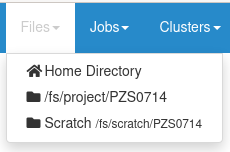Customization¶
Announcements¶
To add an announcement message that appears at the top of the dashboard you can create a file at /etc/ood/config/announcement.(md|yml) or /etc/ood/config/announcements.d/any_file_name.(md|yml).
On each request the dashboard will check for the existence of this file. If it exists, the contents will be converted using markdown converter to HTML and displayed inside a bootstrap alert.
For example, if I create an announcement.md file with the contents:
**NOTICE:** There will be a two day downtime on February 21-22, 2017. OSC OnDemand will be unavailable during this period. For details, please visit [http://bit.ly/2jhfyh7](http://bit.ly/2jhfyh7).
the user would see this message at the top of the dashboard:
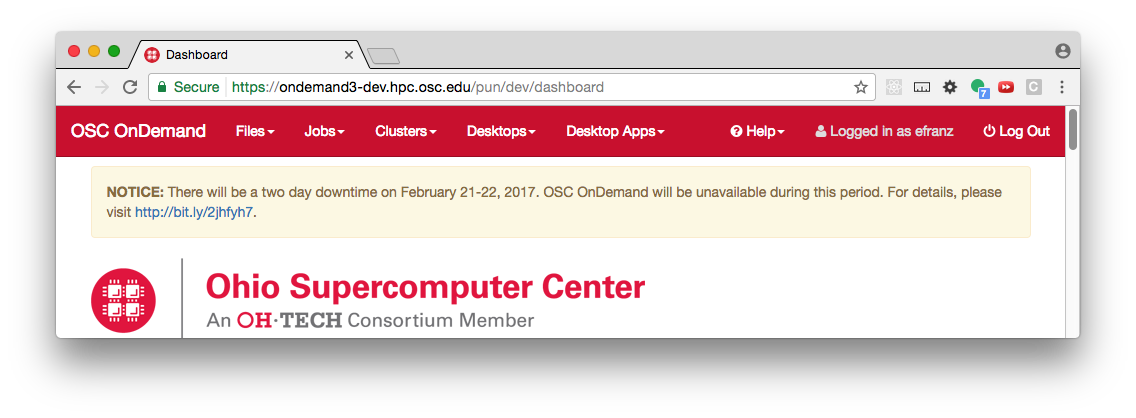
Fig. 1 Example of the Dashboard announcement.
If the announcement file has the extension yml and is a yaml file it is first rendered using ERB and then the resulting file is parsed as YAML. The valid keys are:
| type | warning, info, success, or danger | this is the Bootstrap alert style |
|---|---|---|
| msg | string containing markdown formatted message | if this is a blank string (only whitespace), the alert will not display |
Because the announcement is rendered via ERB you can do some interesting things, like stop showing the announcement past a specified date:
type: warning msg: | <% if Time.now < Time.new(2018, 9, 24, 12, 0, 0) %> A **Ruby Partial Downtime** for 4 hours on Monday, September 24 from 8:00am to 12:00pm will prevent SSH login to Ruby nodes and and Ruby VDI sessions. <% end %>
Note
Warnings about the announcement file being missing may be present in users’ nginx logs. Despite the warning the Dashboard will still function normally without those files being present.
Message of the Day (MOTD)¶
You can configure the Dashboard to display the /etc/motd file on the front page - the same file that is displayed when ssh-ing to a login node.
To display a MOTD file on the Dashboard ensure that the environment variables $MOTD_PATH and $MOTD_FORMAT are set, where
MOTD_PATH="/etc/motd" # this supports both file and RSS feed URIs MOTD_FORMAT="txt" # markdown, txt, rss
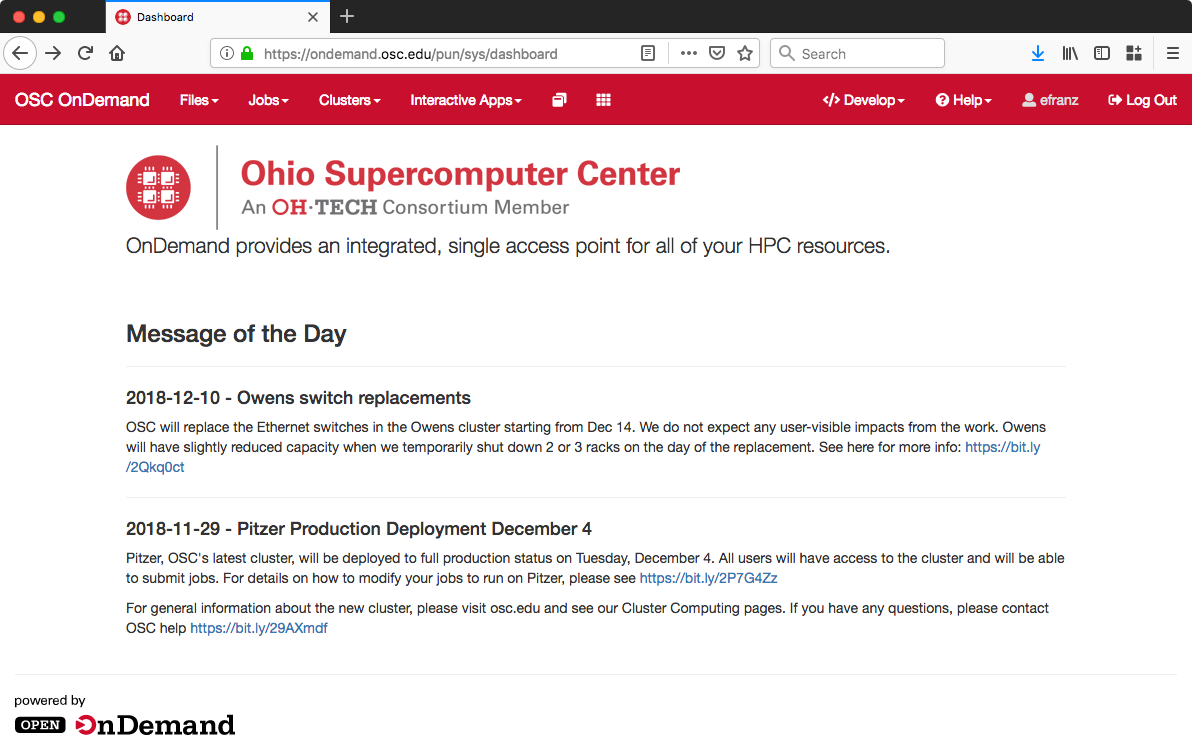
Fig. 2 Message of the Day appears in the body of the index page.
We recommend setting this in /etc/ood/config/apps/dashboard/env.
Branding¶
You can customize the logo, favicon, title, and navbar colors of OnDemand.
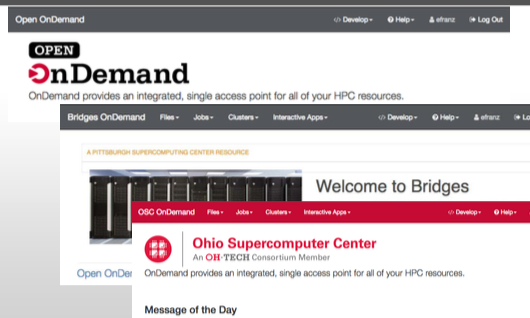
We recommend setting these environment variables in /etc/ood/config/nginx_stage.yml as YAML mappings (key value pairs) in the mapping (hash/dictionary) pun_custom_env. Alternatively you can set these in the env files of the dashboard and the apps. Currently only the dashboard uses the colors in the navbar.
| Feature | Environment Variable | Details |
|---|---|---|
| Title | OOD_DASHBOARD_TITLE | The title appears in the navbar and is controlled by the environment variable $OOD_DASHBOARD_TITLE. The default value is “Open OnDemand”. |
| Logo | OOD_DASHBOARD_LOGO | The default value for OOD_DASHBOARD_LOGO is /public/logo.png and this should be the URL to the logo. By default if you place a logo.png at /var/www/ood/public/logo.png it will be accessible via the URL https://your.ondemand.institution.edu/public/logo.png. |
| Favicon | OOD_PUBLIC_URL | The favicon is expected to exist at the path $OOD_PUBLIC_URL/favicon.ico. For a default OOD installation the favicon will be located at /var/www/ood/public/favicon.ico. |
| Brand background color | OOD_BRAND_BG_COLOR | Controls the background color of the navbar in the dashboard |
| Brand foreground color | OOD_BRAND_LINK_ACTIVE_BG_COLOR | Controls the background color the active link in the navbar in the dashboard |
| Replace header title with logo | OOD_DASHBOARD_HEADER_IMG_LOGO | Value should be url to logo i.e. /public/logo.png. the background color the active link in the navbar in the dashboard |
| Use white text on black background for navbar. | OOD_NAVBAR_TYPE | By default we use inverse for this value, which specifies to use Bootstrap 3’s inverted navbar where text is white and background is black (or dark grey). You can set this to default to use black text on light grey background if it fits your branding better. |

Fig. 3 Nav bar if I set OOD_BRAND_BG_COLOR to #0000ff and OOD_BRAND_LINK_ACTIVE_BG_COLOR to #ff0000 and OOD_DASHBOARD_TITLE to OSC OnDemand
Warning
If setting in nginx_stage.yml, careful to set the value using quotes i.e. OOD_BRAND_BG_COLOR: '#0000ff'. If you omit the quotes, YAML will see # as a comment and the value of the OOD_BRAND_BG_COLOR will be nil
Whitelist Directories¶
By setting a colon delimited WHITELIST_PATH environment variable, the Job Composer, File Editor, and Files app respect the whitelist in the following manner:
- Users will be prevented from navigating to, uploading or downloading, viewing, editing files that is not an eventual child of the whitelisted paths
- Users will be prevented from copying a template directory from an arbitrary path in the Job Composer if the arbitrary path that is not an eventual child of the whitelisted paths
- Users should not be able to get around this using symlinks
We recommend setting this environment variable in /etc/ood/config/nginx_stage.yml as a YAML mapping (key value pairs) in the mapping (hash/dictionary) pun_custom_env i.e. below would whitelist home directories, project space, and scratch space at OSC:
pun_custom_env:
WHITELIST_PATH: "/users:/fs/project:/fs/scratch"
Warning
This is not yet used in production at OSC, so we consider this feature “experimental” for now.
Warning
This whitelist is not enforced across every action a user can take in an app (including the developer views in the Dashboard). Also, it is enforced via the apps themselves, which is not as robust as using cgroups on the PUN.
Set Default SSH Host¶
In /etc/ood/config/apps/shell/env set the env var DEFAULT_SSHHOST to change the default ssh host. Otherwise it will default to “localhost” i.e. add the line DEFAULT_SSHHOST="localhost".
This will control what host the shell app ssh’s to when the URL accessed is /pun/sys/shell/ssh/default which is the URL other apps will use (unless there is context to specify the cluster to ssh to).
Shell App SSH Command Wrapper¶
Since OOD 1.7 you can use an ssh wrapper script in the shell application instead of just the ssh command.
This is helpful when you pass add additional environment variable through ssh (-o SendEnv=MY_ENV_VAR) or ensure some ssh command options be used.
To use your ssh wrapper configure OOD_SSH_WRAPPER=/usr/bin/changeme to point to your script in /etc/ood/config/apps/shell/env. Also be sure to make your script executable.
Here’s a simple example of what a wrapper script could look like.
#!/bin/bash
args="-o SendEnv=MY_ENV_VAR"
exec /usr/bin/ssh "$args" "$@"
Fix Unauthorized WebSocket Connection in Shell App¶
If you see a 401 error when attempting to launch a Shell app session, where the request URL starts with wss:// and the response header includes X-OOD-Failure-Reason: invalid origin, you may need to set the OOD_SHELL_ORIGIN_CHECK configuration option.
There is a security feature that adds proper CSRF protection using both the Origin request header check and a CSRF token check.
The Origin check uses X-Forwarded-Proto and X-Forwarded-Host that Apache mod_proxy sets to build the string that is used to compare with the Origin request header the browser sends in the WebSocket upgrade request.
In some edge cases this string may not be correct, and as a result valid WebSocket connections will be denied. In this case you can either set OOD_SHELL_ORIGIN_CHECK env var to the correct https string, or disable the origin check altogether by setting OOD_SHELL_ORIGIN_CHECK=off (or any other value that does not start with “http”) in the /etc/ood/config/apps/shell/env file.
Either way the CSRF token will still provide protection from this vulnerability.
# /etc/ood/config/apps/shell/env
# to disable it, just configure it with something that doesn't start with http
OOD_SHELL_ORIGIN_CHECK='off'
# to change it simply specify the http(s) origin you want to verify against.
OOD_SHELL_ORIGIN_CHECK='https://my.other.origin'
Custom Job Composer Templates¶
Below explains how job templates work for the Job Composer and how you can add your own. Here is an example of the templates we use at OSC for the various clusters we have
Job Templates Overview¶
“Job Composer” attempts to model a simple but common workflow. When creating a new batch job to run a simulation a user may:
- copy the directory of a job they already ran or an example job
- edit the files
- submit a new job
“Job Composer” implements these steps by providing the user job template directories and the ability to make copies of them: (1) Copy a directory, (2) Edit the files, and (3) Submit a new job.
- Copy a directory of a job already ran or an example job
- User can create a new job from a “default” template. A custom default template can be defined at
/etc/ood/config/apps/myjobs/templates/defaultor under the app deployment directory at/var/www/ood/apps/sys/myjobs/templates/default. If no default template is specified, the default is/var/www/ood/apps/sys/myjobs/example_templates/torque - user can select a directory to copy from a list of “System” templates the admin copied to
/etc/ood/config/apps/myjobs/templatesor under the app deployment directory at/var/www/ood/apps/sys/myjobs/templatesduring installation - user can select a directory to copy from a list of “User” templates that the user has copied to
$HOME/ondemand/data/sys/myjobs/templates - user can select a job directory to copy that they already created through “Job Composer” from
$HOME/ondemand/data/sys/myjobs/projects/default
- User can create a new job from a “default” template. A custom default template can be defined at
- Edit the files
- user can open the copied job directory in the File Explorer and edit files using the File Editor
- Submit a new job
- user can use the Job Options form specify which host to submit to, what file is the job script
- user can use the web interface to submit the job to the batch system
- after the job is completed, the user can open the directory in the file explorer to view results
Job Template Details¶
A template consists of a folder and a manifest.yml file.
The folder contains files and scripts related to the job.
The manifest contains additional metadata about a job, such as a name, the default host, the submit script file name, and any notes about the template.
name: A Template Name
host: ruby
script: ruby.sh
notes: Notes about the template, such as content and function.
In the event that a job is created from a template that is missing from the manifest.yml, “Job Composer” will assign the following default values:
nameThe name of the template folder.hostThe cluster id of the first cluster with a valid resource_mgr listed in the OOD cluster configscriptThe first.shfile appearing in the template folder.notesThe path to the location where a template manifest should be located.
Job Composer Script Size Limit¶
Since 1.7 the Job composer shows users ‘Suggested file(s)’ and ‘Other valid file(s)’. Other valid files are
_any_ files less than OOD_MAX_SCRIPT_SIZE_KB which defaults to 65 (meaning 65kb).
To reconfigure this, simply set the environment variable in the job composers’ env file
/etc/ood/config/apps/myjobs/env like so:
# show any file less than or equal to 15 kb
OOD_MAX_SCRIPT_SIZE_KB=15
Custom Error Page for Missing Home Directory on Launch¶
Some sites have the home directory auto-create on first ssh login, for example
via pam_mkhomedir.so. This introduces a problem if users first access the system
through OnDemand, which expects the existence of a user’s home directory.
In OnDemand <= 1.3 if the user’s home directory was missing a non-helpful single
string error would display. Now a friendly error page displays. This error page
can be customized by adding a custom one to /etc/ood/config/pun/html/missing_home_directory.html.
The default error page looks like this:
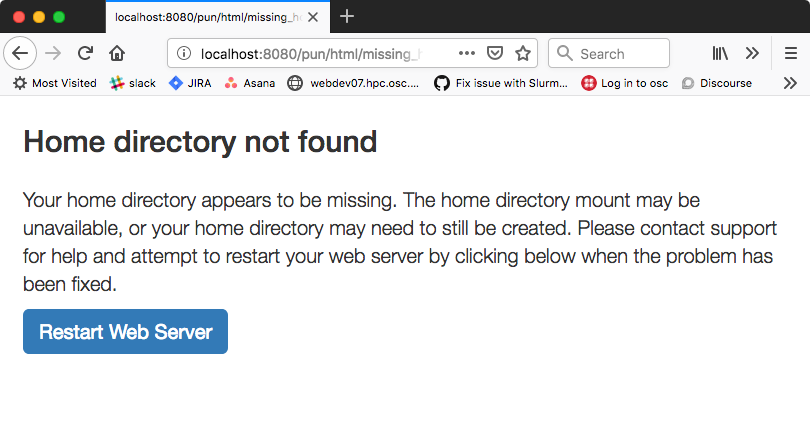
An example of a custom error page has been provided at /opt/ood/nginx_stage/html/missing_home_directory.html.example.pam_mkhomedir and can be copied to /etc/ood/config/pun/html/missing_home_directory.html. This example directs the user to first click a link to open the shell app which will create the home directory. The shell app’s default host must be configured to be a host that is appropriate for this purpose. The custom error page looks like this:
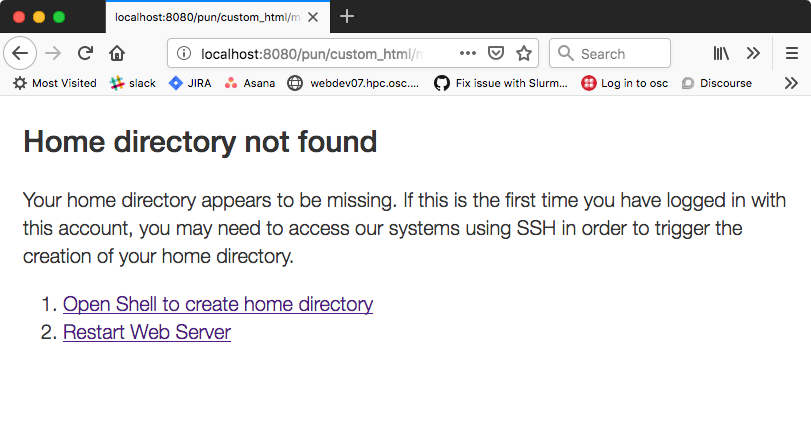
See this Discourse discussion for details.
Customize Text in OnDemand¶
Using Rails support for Internationaliation (i18n), we have internationalized many strings in the Dashboard and the Job Composer apps.
Initial translation dictionary files with defaults that work well for OSC and using the English locale (en) have been added (/var/www/ood/apps/sys/dashboard/config/locales/en.yml and /var/www/ood/apps/sys/myjobs/config/locales/en.yml). Sites wishing to modify these strings in order to provide site specific replacements for English, or use a different locale altogether, should do the following:
- Copy the translation dictionary file (or create a new file with the same stucture of the keys you want to modify) to
/etc/ood/config/locales/en.ymland modify that copy. - If you want apps to look for these dictionary files in a different location than
/etc/ood/config/locales/en.ymlyou can change the location by definingOOD_LOCALES_ROOTenvironment variable. - The default locale is “en”. You can use a custom locale. For example, if you want the locale to be French, you can create a
/etc/ood/config/locales/fr.ymland then configure the Dashboard to use this locale by setting the environment variableOOD_LOCALE=frwhere the locale is just the name of the file without the extension. Do this in either the nginx_stage config or in the Dashboard and Job Composer env config file.
In each default translation dictionary file the values that are most site-specific (and thus relevant for change) appear at the top.
| File path | App | Translation namespace |
|---|---|---|
/var/www/ood/apps/sys/dashboard/config/locales/en.yml |
Dashboard | dashboard |
/var/www/ood/apps/sys/myjobs/config/locales/en.yml |
Job Composer | jobcomposer |
/etc/ood/config/locales/en.yml |
All localizable apps will check this path, unless OOD_LOCALES_ROOT is set. |
Any |
Warning
Translations have certain variables passed to them for example %{support_url}. Those variables may be used or removed from the translation. Attempting to use a variable that is not available to the translation will crash the application.
Note
Localization files are YAML documents; remember that YAML uses spaces for indentation NOT tabs per the YAML spec.
Note
OnDemand uses the convention that translations that accept HTML with be suffixed with _html. Any other translation will be displayed as plain text.
Change the Dashboard Tagline¶
en:
dashboard:
welcome_html: |
%{logo_img_tag}
<p class="lead">OnDemand provides an integrated, single access point for all of your HPC resources.</p>
motd_title: "Message of the Day"
The welcome_html interpolates the variable logo_img_tag with the default
logo, or the logo specified by the environment variable OOD_DASHBOARD_LOGO.
You may omit this variable in the value you specify for welcome_html if you prefer.
Change quota messages in the Dashboard¶
Two messages related to file system usage that sites may want to change:
quota_additional_message- gives the user advice on what to do if they see a quota warningquota_reload_message- tells the user that they should reload the page to see their quota usage change, and by default also tells users that the quota values are updated every 5 minutes
Customize Text in the Job Composer’s options form¶
The OSC-default value for options_account_help says that the account field is optional unless a user is a member of multiple projects.
Items of note include what to call Accounts which might also be Charge Codes, or Projects. At OSC entering an account is optional unless a user is a member of multiple projects which is reflected in the default value for the string options_account_help.
Disable Safari Warning on Dashboard¶
We currently display an alert message at the top of the Dashboard mentioning that we don’t currently support the Safari browser. This is because of an issue in Safari where it fails to connect to websockets if the Apache proxy uses Basic Auth for user authentication (on by default for new OOD installations).
If you ever change the authentication mechanism to a cookie-based mechanism (e.g., Shibboleth or OpenID Connect), then it is recommended you disable this alert message in the dashboard.
You can do this by modifying the /etc/ood/config/apps/dashboard/env file as such:
DISABLE_SAFARI_BASIC_AUTH_WARNING=1
Disk Quota Warnings on Dashboard¶
You can display warnings to users on the Dashboard if their disk quota is nearing its limit. This requires an auto-updated (it is recommended to update this file every 5 minutes with a cronjob) JSON file that lists all user quotas. The JSON schema for version 1 is given as:
{
"version": 1,
"timestamp": 1525361263,
"quotas": [
{
...
},
{
...
}
]
}
Where version defines the version of the JSON schema used, timestamp
defines when this file was generated, and quotas is a list of quota objects
(see below).
You can configure the Dashboard to use this JSON file (or files) by setting the
environment variable OOD_QUOTA_PATH as a colon-delimited list of all JSON
file paths in the /etc/ood/config/apps/dashboard/env file. In addition to
pointing to files OOD_QUOTA_PATH may also contain HTTP(s) or FTP protocol
URLs. Colons used in URLs are correctly handled and are not treated as delimiters.
Warning
Sites using HTTP(s) or FTP for their quota files may see slower dashboard load times, depending on the responsiveness of the server providing the quota file(s).
The default threshold for displaying the warning is at 95% (0.95), but this
can be changed with the environment variable OOD_QUOTA_THRESHOLD.
An example is given as:
# /etc/ood/config/apps/dashboard/env
OOD_QUOTA_PATH="/path/to/quota1.json:https://example.com/quota2.json"
OOD_QUOTA_THRESHOLD="0.80"
Individual User Quota¶
If the quota is defined as a user quota, then it applies to only disk
resources used by the user alone. This is the default type of quota object and
is given in the following format:
Warning
A block must be equal to 1 KB for proper conversions.
Individual Fileset Quota¶
If the quota is defined as a fileset quota, then it applies to all disk
resources used underneath a given volume. This requires the object to be
repeated for each user that uses disk resources under this given volume.
The format is given as:
{
"type": "fileset",
"user": "user1",
"path": "/path/to/volume2",
"block_usage": 500,
"total_block_usage": 1000,
"block_limit": 2000,
"file_usage": 1,
"total_file_usage": 5,
"file_limit": 10
}
Where block_usage and file_usage are the disk resource usages attributed to
the specified user only.
Note
For each user with resources under this fileset, the above object will be repeated with just user, block_usage, and file_usage changing.
Balance Warnings on Dashboard¶
You can display warnings to users on the Dashboard if their resource balance is nearing its limit. This requires an auto-updated (it is recommended to update this file daily with a cronjob) JSON file that lists all user balances. The JSON schema for version 1 is given as:
{
"version": 1,
"timestamp": 1525361263,
"config": {
"unit": "RU",
"project_type": "project"
},
"balances": [
{
...
},
{
...
}
]
}
Where version defines the version of the JSON schema used, timestamp
defines when this file was generated, and balances is a list of quota objects
(see below).
The value for config.unit defines the type of units for balances and
config.project_type would be project, account, or group, etc.
Both values are used in locales and can be any string value.
You can configure the Dashboard to use this JSON file (or files) by setting the
environment variable OOD_BALANCE_PATH as a colon-delimited list of all JSON
file paths.
Warning
Sites using HTTP(s) or FTP for their balance files may see slower dashboard load times, depending on the responsiveness of the server providing the quota file(s).
The default threshold for displaying the warning is at 0, but this
can be changed with the environment variable OOD_BALANCE_THRESHOLD.
An example is given as:
# /etc/ood/config/apps/dashboard/env
OOD_BALANCE_PATH="/path/to/balance1.json:/path/to/balance2.json"
OOD_BALANCE_THRESHOLD=1000
User Balance¶
If the balance is defined as a user balance, then it applies to only that user. Omit the project key:
{
"user": "user1",
"value": 10
}
Project Balance¶
If the balance is defined as a project balance, then it applies to a project/account/group, whatever is defined for config.project_type:
{
"user": "user1",
"project": "project1",
"value": 10
}
Maintenance Mode¶
As an administrator you may want to have some downtime of the Open OnDemand service for various reasons, while still telling your customers that the downtime is expected.
You can do this by setting Open OnDemand in ‘Maintenance Mode’. Apache will serve
/var/www/ood/public/maintenance/index.html which you can change or brand to be your own. Changes
to this file will persist through upgrades.
Apache returns this html file and a 503 response code to all users who’s IP does not match one of the configured whitelist regular expressions. The whitelist is to allow staff, localhost or a subset of your users access while restricting others.
In this example we allow access to anyone from 192.168.1..* which is the 192.168.1.0/24 CIDR and
the single IP ‘10.0.0.1’.
These are the settings you’ll need for this functionality.
# /etc/ood/config/ood_portal.yml
use_rewrites: true
use_maintenance: true
maintenance_ip_whitelist:
# examples only! Your ip regular expressions will be specific to your site.
- '192.168.1..*'
- '10.0.0.1'
To start maintenance mode (and thus start serving this page) simply touch /etc/ood/maintenance.enable
to create the necessary file. When your downtime is complete just remove the file and all the
traffic will be served normally again. The existence of this file is what starts or stops maintenance
mode, not it’s content, so you will not need to restart apache or modify it’s config files for this to
take affect.
Grafana support¶
It’s possible to display Grafana graphs within the ActiveJobs app when a user expands a given job.
Grafana must be configured to support embedded panels and at this time it is also required to have a anonymous organization. Below are configuration options are needed to support displaying Grafana panels in ActiveJobs. Adjust org_name to match whatever organization you wish to be anonymous.
Warning
Changing a Grafana install to support anonymous access can cause unintended consequences for how authenticated users interact with Grafana. It’s recommended to test anonymous access on a non-production Grafana install if you do not already support anonymous access.
[auth.anonymous]
enabled = true
org_name = Public
org_role = Viewer
[security]
allow_embedding = true
The dashboard used by OSC is the OnDemand Clusters dashboard.
Settings used to access Grafana are configured in the cluster config. The following is an example from OSC:
custom:
grafana:
host: "https://grafana.osc.edu"
orgId: 3
dashboard:
name: "ondemand-clusters"
uid: "aaba6Ahbauquag"
panels:
cpu: 20
memory: 24
labels:
cluster: "cluster"
host: "host"
jobid: "jobid"
When viewing a dashboard in Grafana choose the panel you’d wish to display and select Share. Then choose the Embed tab which will provide you with the iframe URL that will need to be generated within OnDemand. The time ranges and values for labels (eg: var-cluster=) will be autofilled by OnDemand.
orgIdis theorgIdquery parameter- The dashboard
nameis the last segment of the URI before query parameters - The
uid`is the UID portion of URL that is unique to every dashboard - The
panelIdquery parameter will be used as the value for eithercpuormemorydepending on the panel you have selected - The values for
labelsare how OnDemand maps labels in Grafana to values expected in OnDemand. Thejobidkey is optional, the others are required.
Disable Host Link in Batch Connect Session Card¶
Batch connect session cards like this have links to the compute node on which the job is currently running (highlighted).

However, some sites may want to disable this feature because they do not allow ssh sessions on the compute nodes.
To disable this, simply set the environment variable in the dashboards’ env file
/etc/ood/config/apps/dashboard/env to a falsy value (0, false, off).
# don't show ssh link in batch connect card
OOD_BC_SSH_TO_COMPUTE_NODE=off
Set Illegal Job Name Characters¶
If you encounter an issue in running batch connect applications complaining about invalid job names like the error below.
Unable to read script file because of error: ERROR! argument to -N option must not contain /
To resolve this set OOD_JOB_NAME_ILLEGAL_CHARS to / for all OOD applications in the
pun_custom_env attribute of the /etc/ood/config/nginx_stage.yml file.
# /etc/ood/config/nginx_stage.yml
pun_custom_env:
- OOD_JOB_NAME_ILLEGAL_CHARS: "/"
